Athlete of the week: Valentina Vaulet
Local 10-minute plays offer slice of life at Tsunami Books
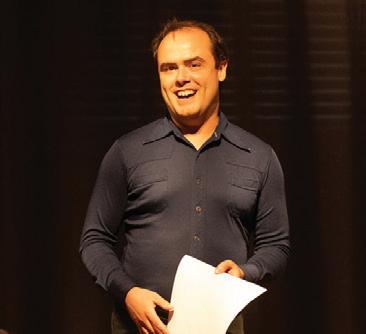

Local 10-minute plays offer slice of life at Tsunami Books

Amid a slowing economy, local businesses face rising costs and uncertainty as new U.S. tariffs take hold.
By Lucas Hellberg News Reporter
Oregon’s economy is losing momentum just as new U.S. import tariffs drive up business costs, reducing profit margins and increasing consumer prices already strained by inflation.
State economists say Oregon is trailing the nation in growth, and that job losses are mounting across several industries. The state in July had nearly 25,000 fewer jobs than it did a year ago.
“This is economically unprecedented territory,” Oregon Chief Economist Carl Riccadonna said.
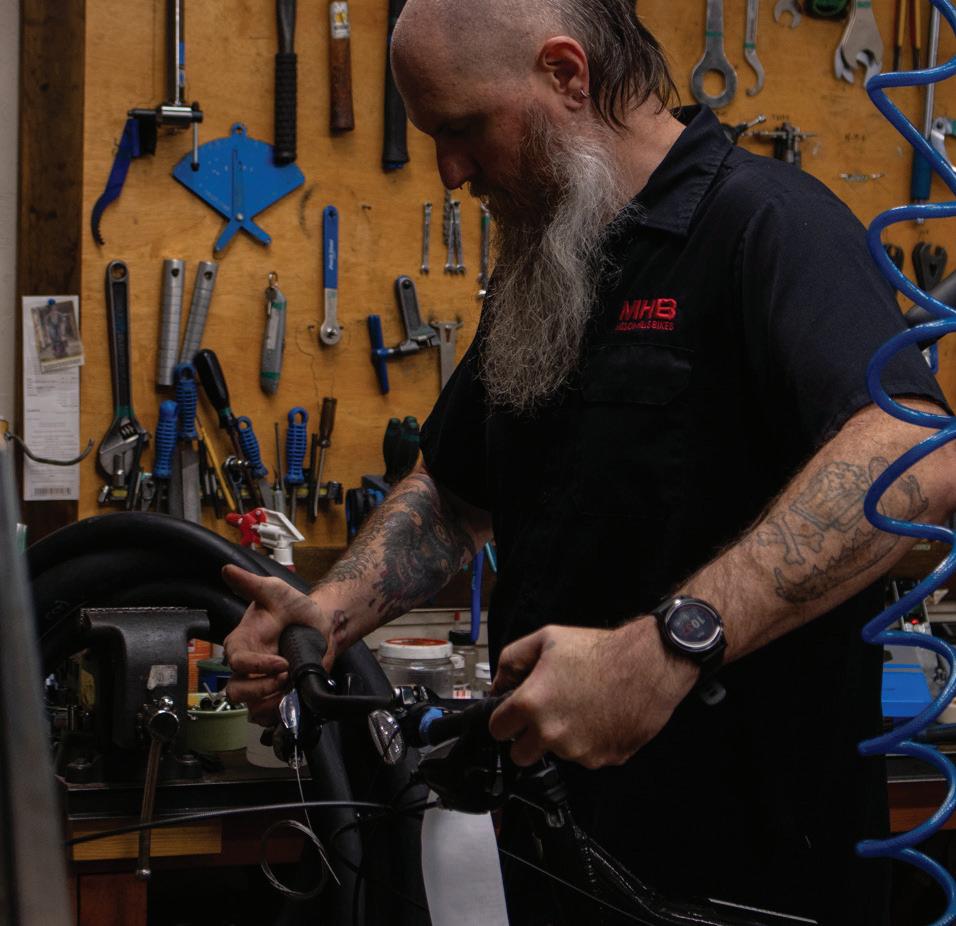

Opinion: President Trump's attack on mail-in ballots especially hurts UO students, so it’s important to protect access to the ballot and fight misinformation.
By Aishiki Nag Opinion Columnist
Oregon has a rich bipartisan history behind mail-in ballot initiatives, with Oregon voters approving mail-in ballots for all biennial elections and general elections in 1998. This made Oregon the first U.S. state to have all major elections be determined by mail-in ballots. The 2000 presidential general election, the first major election with statewide mail-in ballots, had a 79% turnout, one of the highest voter turnouts in the country. Mail-in ballots provide more people with the chance to participate in elections. Those that have school, university or work a full time job often struggle to make it to the polls. Mail-in ballots provide
By Sasha Love Senior News Reporter
Food waste amounts to 92 billion pounds annually, according to the nonprofit group Feeding America. Though food doesn’t last forever, throwing scraps in the trash doesn’t have to be your only option.
Eugene residents with household recycling and trash bins are also provided with gray bins for composting by the city. Disposal of food waste in this gray bin comes at no additional cost and is processed through the Love Food Not Waste® program. The program partners with Rexius, a landscaping and waste management company, to turn the food into compost.






EDITOR IN CHIEF
Tarek Anthony
PRINT MANAGING EDITOR
Ryan Ehrhart
DIGITAL MANAGING EDITOR
Ysabella Sosa
NEWS EDITOR
Reilly Norgren
INVESTIGATIONS EDITOR
Ana Narayan
A&C EDITOR
Claire Coit
SPORTS EDITOR
Jack Lazarus
OPINION EDITOR
Gracie Cox
PHOTO EDITOR
Saj Sundaram
COPY CHIEF
Olivia Ellerbruch
VIDEO EDITOR
Jake Nolan
PODCAST EDITOR
Stephanie Hensley
SOCIALS EDITOR
Ysabella Sosa
VISUALS EDITOR
Noa Schwartz
DESIGN EDITOR
Adaleah Carman
DESIGNERS
Eva Andrews
PUBLISHER AND PRESIDENT
Eric Henry (X317) ehenry@dailyemerald.com
VP OPERATIONS
Kathy Carbone (X302) kcarbone@dailyemerald.com
DIRECTOR OF SALES & DIGITAL MARKETING
Shelly Rondestvedt (X303) srondestvedt@dailyemerald. com
CREATIVE & TECHNICAL
DIRECTOR
Anna Smith (X327) creative@dailyemerald.com
ACCOUNT EXECUTIVES
Torin Chevalier
Camcole Pereira
Ava Stephanian Elliot Byrne
THE DAILY EMERALD
The Daily Emerald is published by Emerald Media Group, Inc., the independent nonprofit media company at the University of Oregon. Formerly the Oregon Daily Emerald, the news organization was founded in 1900.
Emerald Media Group 1395 University St.,#302 Eugene, Or 97403 (541)-346-5511

Lopez-Duboff becomes the third ASUO senator to resign in the last three months.
By Joseph Chiu Associate News Editor
Taliek Lopez-DuBoff tendered his resignation from the Associated Students of the University of Oregon Senate in an email statement late on Oct. 8, effective immediately.
The former senator said he has been honored to represent the university and is proud to have played a part in making it “a more inclusive and responsive place for all students.”
Lopez-DuBoff said he believes ASUO is “on a troubling course” where “division overshadows purpose and collaboration.” In the resignation, Lopez-DuBoff cited divisiveness, which he claimed was reminiscent of the Trump administration.
The council voted to recommend the city manager pause the use of license plate-capturing cameras.
By Billie Corsetti News Reporter
The Eugene City Council voted 8-0 to pass a motion recommending the City Manager Sarah Medary to pause all Flock Safety camera activity at a council meeting on Wednesday.
During the meeting, Police Chief Chris Skinner gave a presentation to the council on EPD’s contract with Flock Safety, a security company, and the department’s use of information gained from the Automated License Plate Readers. The presentation reiterated that the cameras only capture rear license plates and do not have a facial recognition system.
Skinner also highlighted language in EPD’s contract with Flock Safety that was revised due to being too vague or general. The amended contract specifies that data can only be disclosed to government authorities if a court issues a subpoena, warrant or court order.
Seven people were taken into custody Thursday after police surrounded a home allegedly connected to a months-long burglary ring.
By Reilly Norgren

News Editor
Seven suspects were arrested Thursday in connection to an Oct. 6 burglary. The arrests followed a several hour shelter-in-place notice between Franklin Boulevard, South Fairmount Boulevard, Walnut Street and Augusta Street.
On Oct. 6, a home in the Bethel area was burglarized by a person posing as a pizza delivery driver, according to a video obtained by the Eugene Police Department.
After locating two additional suspects, all were traced back to 2400 block of Skyline Boulevard where the suspects sheltered inside a residence.
Police monitored the location until a search warrant was granted — upon serving the warrant, seven people fled the property, which led to a several hour shelter-inplace issued to nearby neighborhoods.

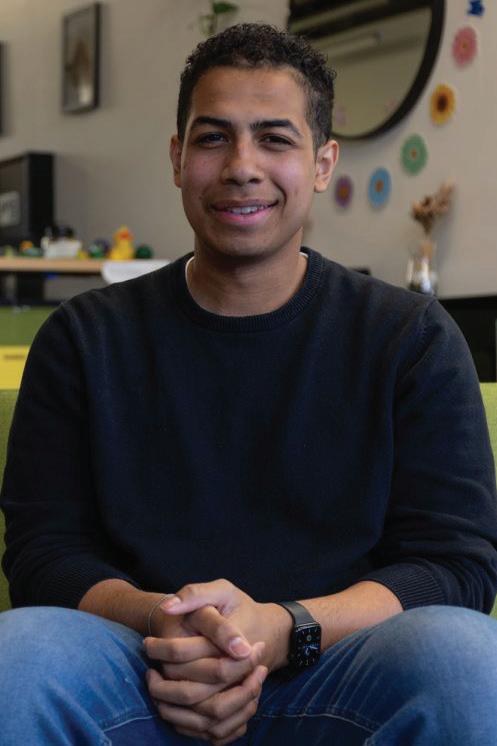


Throughout Eugene, there are several different ways to compost and get engaged with the sustainable process.
“Food is a huge portion of what’s in the landfill and a huge emitter of methane gas. A lot of that gas is released into the atmosphere so (that) is a big emphasis the city took on to divert that material. The diversion of food waste from the landfill was a huge step for that climate action plan,” Donny Addison, waste prevention program manager for the city of Eugene, said.
The compost is then distributed to local nonprofits, school garden programs and businesses like Down to Earth, a garden center.
“We want to make sure that this final product is going back into the community where it came,” Addison said.
Though the city’s composting system is fairly accessible for residents living in houses, apartment dwellers might face more challenges.
Heartwood Apartments is one of few apartment complexes that offers composting services for its residents.
“When we started composting it added to the allure of a better healthy community way of living,” Heartwood Assistant Community Manager Deven Hughes said. “It seems people are more interested in doing this, whether it is for their community or the planet.”
Hughes said that residents who had not had much or any experience composting started to get engaged with the process.
“We definitely got a lot of support starting composting, and we got a lot of people interested in composting that weren’t originally and they started asking questions,” Hughes said.
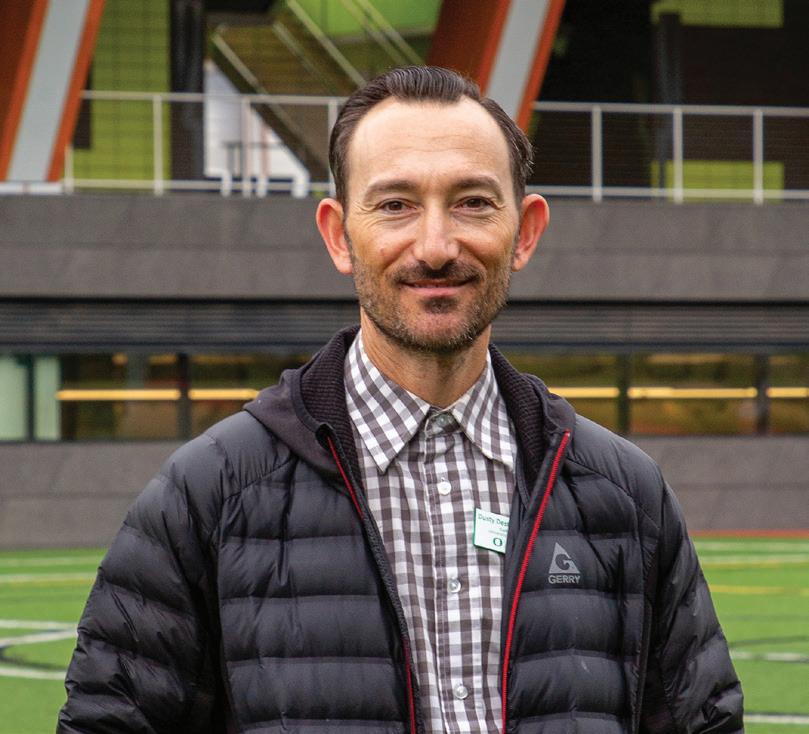
By Corey Hoffman Senior News Reporter
Though the program started as a success, over the summer residents had to throw their food in the trash bin because of the “intense odor” stemming from the apartment’s food waste receptacles.
Students who live in apartments that don’t offer composting services can drop their food off at the Rexius retail site near West Eugene, or at UO’s Grove Garden.
Rexius is a commercial-grade composting site, meaning they are able to process foods such as meat bones, dairy products and highly processed foods which do not decompose in backyard composting systems, including the composting system used by the Grove Garden.
“We don’t have a super large industrial pile (with) so much mass that it’s super super hot, so it’s easier to break down things like fruits and vegetable scraps that are not cooked, (and) coffee grounds, egg shells — we wouldn’t take things that take more time to break down,” Grove Garden co-coordinator Valentine Bentz said.
Bentz said the largest problem they have encountered with composting at the Grove Garden is people adding processed food that doesn’t biodegrade — despite the compost being kept at around 150 degrees Fahrenheit.
“Composting is really forgiving as long as people are conscious of what they are adding and we keep turning it,” Bentz said.
UO also has a foot in the game, composting 80 tons of food waste produced in dining halls and offices each year, according to Solid Waste and Zero Waste Operations Manager Phil
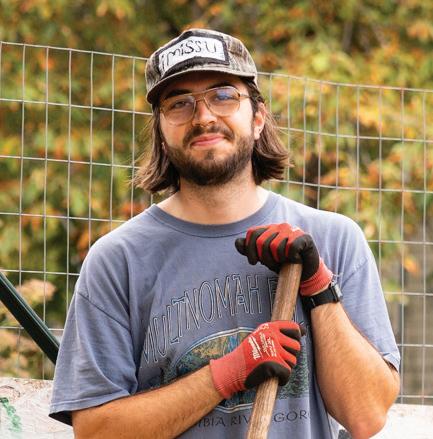
Chesburo. Additionally, UO is “exploring a potential student-led plan” involving composting in residential halls.
“The key challenge is balancing sanitation with stewardship, and details are still being developed,” Chesburo said.
Addison also spoke on the city’s involvement in this plan to potentially expand composting at UO.
“I know students are frustrated that there aren’t a lot of composting bins everywhere, but that would lead to more contamination. I’m hoping we can work with UO to test out a multi-unit pilot program really soon,” Addison said.
( ABOVE) Valentine Bentz, a helper at the Grove Garden, works on clearing the ground and planting native in-ground plants to prepare for the winter in, Eugene, Ore. on Oct. 8, 2025.
(Katie Poluyansky/Emerald)
Catch-Feelings therapy group helps former student athletes adjust to a post-sports life.
hit me that it was the people, not necessarily the sport that I missed and I found other ways to stay active because it was more about being in contact with that community,” Gorwitz said.
Every Monday, a group of strangers walk into a room. They sit in a circle and grieve.
They are part of a new student therapy group on the University of Oregon campus called Catch-Feelings that helps former student athletes adjust to changes in their sports careers through physical movement and group sharing.
The group is a partnership between UO Health Services and UO Intramural Sports and grew out of personal experience. Dusty Destler, the group’s facilitator, played competitive baseball through college and understands the sense of loss, change in identity, grief and confusion that often come with the end of a competitive career.
Destler took those experiences and did some math, calculating what percentage of the UO student body might be feeling the same way. He found that roughly one third of the over 24,000 students on campus “have potentially played some type of sport in high school.”
“That would be looking somewhere in the range of like 8,000 to 10,000 students (who) could be walking on campus dealing with some of these identity issues, sense of loss, you know, concern for what their future might look like. Maybe some of their relationships, or most of their relationships, might have been tied up in the sport or activity that they were doing,” Destler said.
Courtney Gorwitz, a first year graduate student who is not part of the group, said her sports, soccer and field hockey, gave her a community that couldn’t be recreated after they ended.
“I tried out to play a club sport in undergrad and it just sorta
Denzel Jones, who is also not part of Catch-Feelings but played football and ran track, said playing sports was like having a “second family.”
“Just the sport itself, and having the people there to play it with created bonds. It was like a home away from home,” Jones said.
Not having the constant of a sport, Jones said, made him feel “incomplete,” but he’s optimistic about his sports career.
“I’ve run as far as I could, but I still have a little more in me. It feels unnecessary to have the athleticism that I have and not be able to continue,” Jones said.
Catch-Feelings runs for roughly six weeks, with each session split into two components: a physical activity where participants perform “sport specific movements” and a “classic therapy group” session.
Though unconventional for a therapy session, Destler said, the outdoor portion will allow participants to tap into the emotional experience and “procedural memories” they retained while playing a competitive sport.
“The second component is, after the 20 (to) 30 minutes (outside), we’ll walk into a classroom in the rec center, and then that’s where that process group will take place,” Destler said. “Kind of like your classic therapy group, where we’ll all sit in a circle and be able to talk about the things that came up for us that day, which would also include identity pieces and all those other things, like sense of loss, concern about the future, things like that.”
The partnership between UO Rec and UO Health Ser-
vices began in the summer, according to Assistant Director for Intramural Sports and Youth Camps Sean Graninger.
In an emailed statement to The Daily Emerald, Graninger said he hopes students take advantage of the group to help with “the transition away from the structured world” of sports.
“With so many opportunities on campus to stay active and engaged, such as Intramurals, Club Sports, PE classes, and student organizations, we hope every student is able to find a sense of belonging and community during their time at UO,” Graninger said.
The goal of the group, according to Destler, is for student athletes to recognize that they are not alone in their feelings and to reintroduce them to their sport in a different way.
“Oftentimes, when people are kids or adolescents, the way that they are interacting with the sport is often dictated by external forces, whether it’s parents or coaches,” Destler said. “And here’s an opportunity for adults to really put that experience under a microscope and to be like, ‘okay, what of that experience do I want to retain? It feels good, and what of it do I want to shed and kind of make my own value system’ and alter it to work for them.”
The group runs quarterly, once in the fall, winter and spring and does not allow drop-ins.
Editor's note: The Emerald did not interview active members of the group due to program privacy rules.
( ABOVE) Catch-Feelings therapy group facilitator Dusty Destler helps former student athletes adjust to a postsports life. Catch-Feelings is a partnership between University Health Services and UO Intramural Sports.
(Corey Hoffman/Emerald)




all voters with a chance to participate in their democracy.
However, the Trump administration has backed the push to ban mail-in ballots in Oregon, endangering the system. He has pledged to sign an executive order regarding the status of mail-in ballots before the 2026 midterm elections.
Ben Edtl, a Republican political consultant from Tualatin, is leading the campaign to gather signatures to move Oregon to require in-person voting, require “proof of
citizenship” and require a “valid photo ID.” Initiative 37 needs over 156,000 signatures in order to qualify by the November 2026 elections.

Aishiki Nag is a senior studying political science and global studies. She likes to cover state and national politics, and international peacebuilding efforts. When she's not writing for the emerald, she likes to read, hike and travel to new places.

Currently, there is not enough evidence to back the claims made by the leaders of Initiative 37 and the Trump administration’s attacks on mail-in ballots, with the Oregon Secretary of State Tobias Read taking a public stance against misinformed attacks on Oregon’s mail-in system.
These attacks have been strengthened due to massive national misinformation campaigns; spanning from local initiatives to the Trump administration’s proposed attack through executive action.
Mail-in ballots allow UO students, both instate and out-of-state, to participate within their community elections. This attack on mail-in ballots will cause devastating harm to youth participation in elections.
Kali Kleven, a junior at the UO, ran the New Voters Project and shared the importance of mail-in ballots on campus. The New Voters Project, a project run through the Oregon State Public Interest Research Group, leads campaigns focused on new voter registration and then contacting young voters during elections to ensure that they have voted.
“We really believe the student voice is important, because it’s our future,” Kleven explained, “a lot of (low voter turnout) is because of the lack of awareness, and lack of education around voting.”
OSPIRG’s New Voters Project directly led to the increase of youth voter turnout in elections, making youth voter turnout on college campuses comparable to the average turnout of the general population.
Kleven expanded on the importance of mail-in voting for students on the UO campus. “I also know for many students, if you don’t have a car or the resources to go and get back home, or to a polling lo-
cation, it can be really difficult to stay connected,” she said. Mail-in ballots increase accessibility for both in-state and out-of-state students who lack the resources to reach a polling location, as well as for those who work during polling hours and can’t wait in line.
Kleven shared an anecdote about a student from Oklahoma, a state with strict in-person voting norms, who had to prioritize work and school over voting. When they had heard about switching residences to vote in Oregon through the mail-in ballot system, they did it in a heartbeat.
“It was really cool to hear them talk about how they’ve always cared a lot about politics, but quite literally have never had the time or resources to make it (to the ballot box) and vote,” Kleven recalled.
Mia Luscher, a senior at the University of Oregon, shared her perspective as an out-of-state student who receives an absentee ballot and the importance of mail-in ballots to her.
“I’m from Washington, which is two hours away from us, but that’s still extremely inaccessible if I had to go find a ballot box,” Luscher said. “As an out-of-state student, I feel like it’s making it hard (to vote), but also, for in-state people – there are places in Oregon where you’re an hour away from the nearest ballot box and those are often red areas”
Luscher does not see herself going back to Washington soon, and mail-in ballots allow her to participate and vote in elections without barriers to accessibility.
University of Oregon students rely on mail-in ballot voting to rightfully participate in their communities; college students are vital in the civic community, and mail-in ballots protect their civic voices. It’s important for all students to fight for their right for accessible voting.

Rachel Ehly is an opinion columnist for the Daily Emerald and is studying journalism and political science. She could talk for hours about all things politics, pop culture and music, and has a knack for finding meaning in the most insignificant things.
Opinion: Living off-campus as a second year student isn’t always the best option. The dorms are just as welcoming to sophomores as they are to freshmen.
By Rachel Ehly Opinion Columnist
If you told me this time last year I would be living in the same dorm, I wouldn’t believe you. The nine months I spent living in Unthank Hall last year was more than enough.
Fire alarms at midnight, exit signs being pulled from walls and dishes piling up in common spaces were all things I would never miss.
When the time came to find a place to live for our sophomore year, my roommate and I decided our best choice was to live on campus for another year.
We aimed to snag two rooms in Yasui Hall. The freedom we thought we could gain by living in apartment-style housing, while still living on campus and close to our classes was enticing.
The ability to not depend on a meal plan, while still having the security of an RA and a built-in community felt like a middle ground between the dorms and off-campus housing.
When we were choosing our rooms and learned that Yasui was full, we were devastated.
This led us back to where we started: Unthank Hall.
The most fitting word to describe my experi-
ence living in the dorms again is familiar. The only striking difference is the people.
Living with the same people for such a long period of time, I came to expect to see certain faces everyday, even if I never knew their name.
Now, I don’t recognize anyone in my hall. It feels a bit alienating to know that everyone around me is making connections when I’m not, even though I went through the same thing last year as they are now.
RA Abigail Shewaye felt the same when she came back to the dorms.
“As a resident during my freshman year, I knew everyone in my hall,” she said. “When I walked into the dorms, there was no responsibility attached to it, and it simply felt like home.”
As an RA, Shewaye says her experience of living in the dorms has changed.
“When I walk into the building, I am not just coming home, (but) I am also entering my workplace,” she said. “I have to stay more aware of what is happening around me.”
While Shewaye loves helping her residents build a community, she also realizes how different her college experience could have been if she chose to live off-campus.
“(Living in the dorms) sometimes feels like it takes away a sense of independence,” Shewaye said. “If I lived off-campus, I would feel a stronger sense of responsibility because I would be responsible for cooking for myself, paying for utilities and rent.”
Students living in the dorms for more than one year are bound to feel a loss of independence.
Almost everyone you know is now living off-campus and learning how to manage their add-
ed responsibilities, while you’re still bumping into your RA on the elevator. It’s isolating.
UO sophomore Milla Downing feels similarly living in off-campus housing.
Downing feels that the most prominent way that off-campus housing contrasts from the dorms is the lack of social interaction.
“You have to go out of your way to be social because you’re not in such close quarters with other students,” she said.
Having just moved off-campus in September, this is the first time Downing is fully responsible for herself.
Though she did know some people living in her apartment building before moving in, she expressed a difficulty in building a community similar to the one she had while living in the dorms.
I’m facing something similar.
There is a disconnect between first and second-year students in terms of experience.
As a sophomore, I already know my way around campus; I know my favorite study spots and I know the best places to go off-campus. The freshmen in my hall are still figuring these things out.
Despite this, the dorms are a welcoming environment for everyone.
While it can feel lonely being separated from friends living off-campus, on-campus housing provides a strong sense of community.
From movie nights to baking competitions planned in the floor group chat, there is always an opportunity to make connections – even if you’re older than all of your neighbors.
The Trump administration has increased import tariffs through executive action this year, raising prices of imported products like bicycles and wine. The average effective U.S. import tariff rate has risen to its highest level since 1934, reaching 17.9% as of Sept. 26, according to the Yale Budget Lab.
Tariffs are “a tax increase of sorts,” Riccadonna said, adding that tariffs can be paid, in whole or part, by importers, companies and consumers.
Bicycle Way of Life, which has two locations in Eugene, is seeing the new tariffs show up in nearly everything it sells.
Jeff Reynolds, BWOL partner owner, can only name three U.S.-made products in his stores. He said the rest, about 98%, is imported. But he said his suppliers are “definitely” paying some of the tariffs. He also noted that he is buying some items at a bulk discount to reduce tariff price increases.
Reynolds said price increases have varied in recent months, with cheaper bikes for kids remaining stable and more expensive bikes increasing.
“If a kid’s bike that’s $300 goes up 20%, that’s not really
an affordable kid’s bike anymore,” Reynolds said. “But if a $14,000 bike that only a few people buy goes up 20%, that person will probably still buy that bike.”
For Reynolds, the new tariffs have added strain to an already tight margin industry.
“It’s so hard for us to raise the price,” Reynolds said. “In the bike industry, we typically have about a 30% (profit) margin.”
Other industries feel tariff strain
As Oregon’s economy continues to lag behind the nation, Lane County businesses say rising costs and economic uncertainty are slowing growth.
“Uncertainty is just bad for business,” Steve Baker, the owner of Authentica Wines in downtown Eugene, said. “People don’t feel good when they don’t know what’s coming next. They don’t feel like spending money.”
Baker said about 90% of his wine inventory is imported. He said many importers initially tried to absorb the tariffs by splitting them with the foreign suppliers they buy from. But he said tariffs are now being passed on to him because they can no longer absorb the increased expenses.
He said some imported bottles now cost nearly 20% more. He also noted that even domestic wines have become
more expensive as the cost of imported wine rises.
Some people think that tariffs are “really going to help American wine,” Baker said. “It really isn’t doing that. I have seen price increases on domestic wines… (because) people think they can get more now.”
Despite higher wine prices, Baker said his business has stayed “very steady” thanks to buying before the higher tariffs took effect and loyal consumers.
In Springfield, similar pressures are rippling through many businesses.
Vonnie Mikkelsen, president and CEO of the Springfield Area Chamber of Commerce, said nearly 70% of local businesses identified rising costs as their top concern in a recent chamber survey, surpassing workforce issues. She said that’s a first since the chamber started the survey three years ago.
Inflation has been “pretty sticky,” Mikkelsen said, adding that the new tariffs and higher labor costs are also raising costs for local businesses.
Mikkelsen said local businesses are taking a range of steps to manage rising costs, including scaling back hiring, delaying new investments and even raising prices for consumers. However, she said many locally owned businesses with thin margins are not able to pass on higher costs to
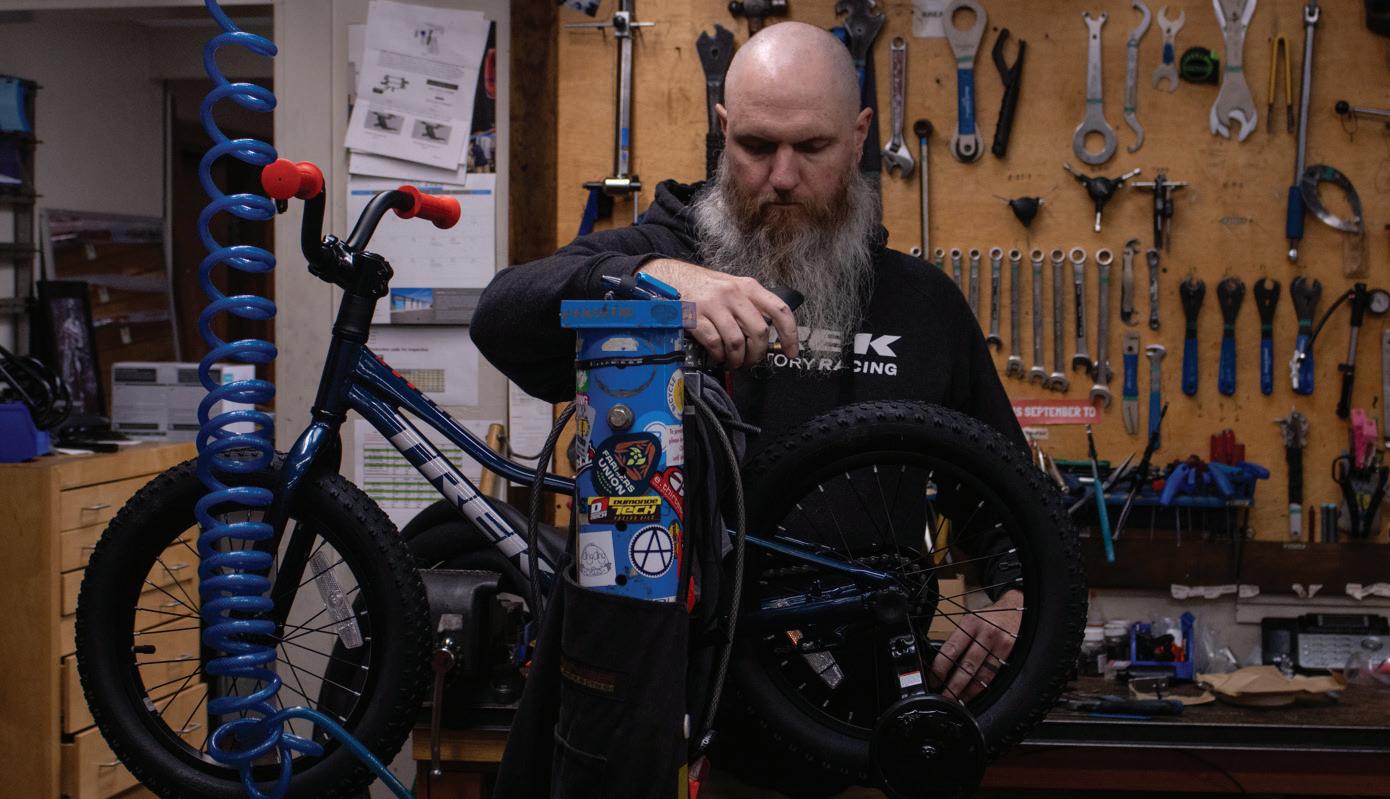
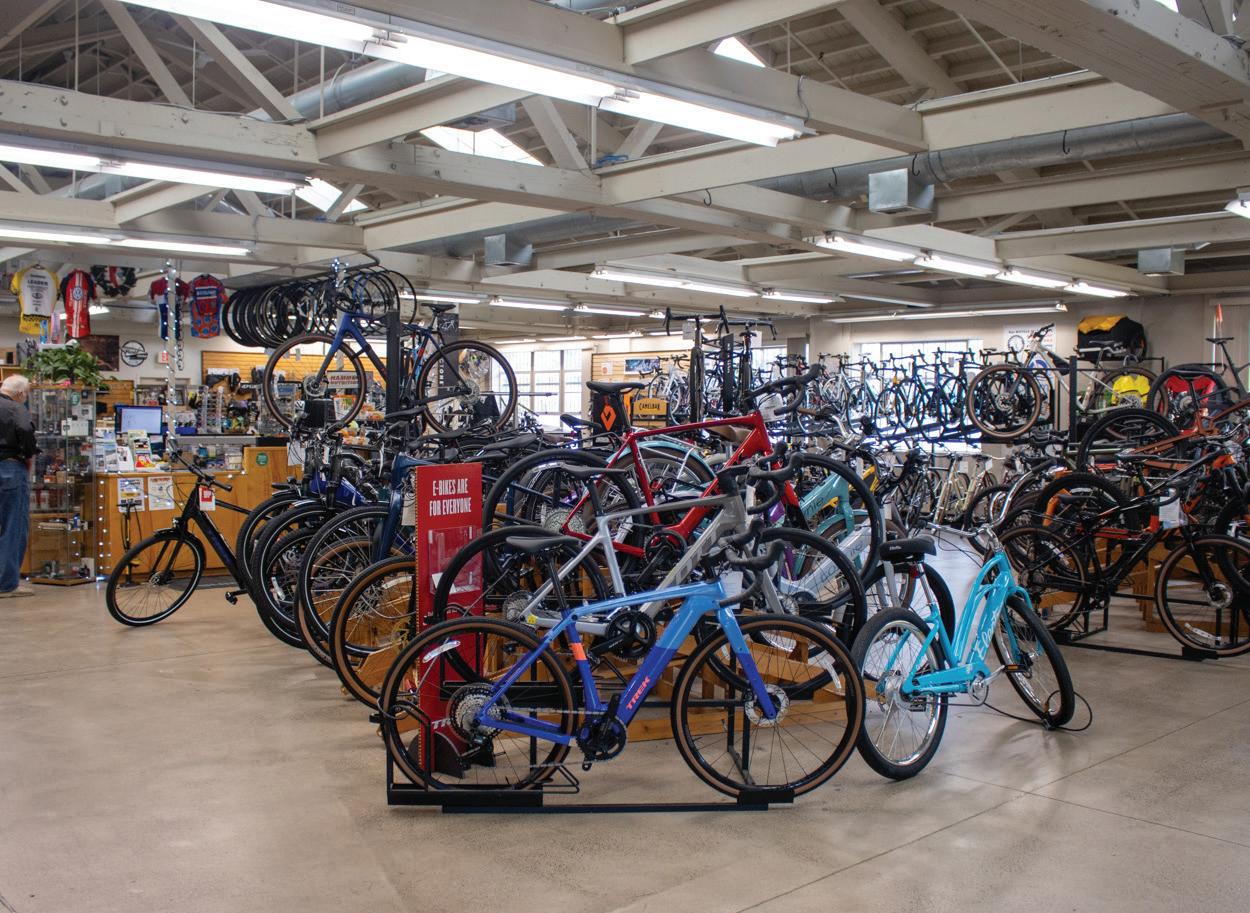
consumers because consumer demand and discretionary spending are in a “pinch.”
Brittany Quick-Warner, president and CEO of the Eugene Area Chamber of Commerce, echoed a similar sentiment, saying many of her members are also delaying new investments and scaling back hiring.
While many businesses are tightening their budgets, Mikkelsen said wood products manufacturing is a bright spot. She said about $500 million in industry investment is planned over the next three to five years in the Eugene-Springfield area.
Sierra Pacific, which has two sawmills in Lane County and is one of the largest lumber manufacturers in the country, declined to comment on this story.
Forest Economic Advisors Principal Paul Jannke said the new tariffs have not yet impacted production costs for Oregon sawmills. He said earlier tariffs and duties have significantly improved the competitive position of Oregon sawmills, and that the latest tariffs are likely to further enhance that advantage.
But for manufacturers that rely heavily on imports, the opposite is true.
Amber Patterson is the chief financial officer of Burley Design, a Eugene-based bike trailer company. She said Burley, which currently manufactures all of its trailers overseas, has managed to avoid price increases on most products so far, thanks in part to suppliers absorbing some tariffs. However, she said tariffs have forced the company to raise the prices of some lower-volume products that typically cost more because there isn’t enough volume to absorb the new tariffs.
“There’s just only so much you can raise your prices before you price out all of your customers,” Patterson said.
At the same time, Patterson said the company is not filling most positions when people leave, forcing it to put its plans to invest more in technology and marketing on hold.
Despite the pressure from the tariffs, Patterson said the company is committed to keeping its entry-level trailers affordable for families.
Columbia Industrial Products, a Eugene-based company that manufactures composite bearing materials and exports its products, declined to comment on this story.
Looking ahead, Lane County businesses are trimming expenses, delaying new projects and holding off on hiring as they wait for clearer economic signals.
As Quick-Warner put it, “One of the hardest parts of doing business is the uncertainty, which drives business costs more than anything else.”
(ON THE COVER, LEFT ) Jeff Reynolds, general manager and partner-owner of Bicycle Way of Life fixes a bike at the downtown location. Bicycle Way of Life, located in Eugene, Ore., sells and services bikes, with some rentals also available.
(Anna Liv Myklebust/Emerald)
( ABOVE) Bicycle Way of Life, located in Eugene, Ore., sells and services bikes, with some rentals also available.
An import tariff is a tax imposed on goods entering a country from abroad and collected by customs officials at the border.
U.S. import tariffs are used for a variety of reasons, including to protect specific domestic industries, further foreign policy goals and as leverage in foreign trade negotiations.
U.S. import tariffs are currently projected to raise prices by 1.7% in the short term, equivalent to a $2,400 loss in average household income in 2025.
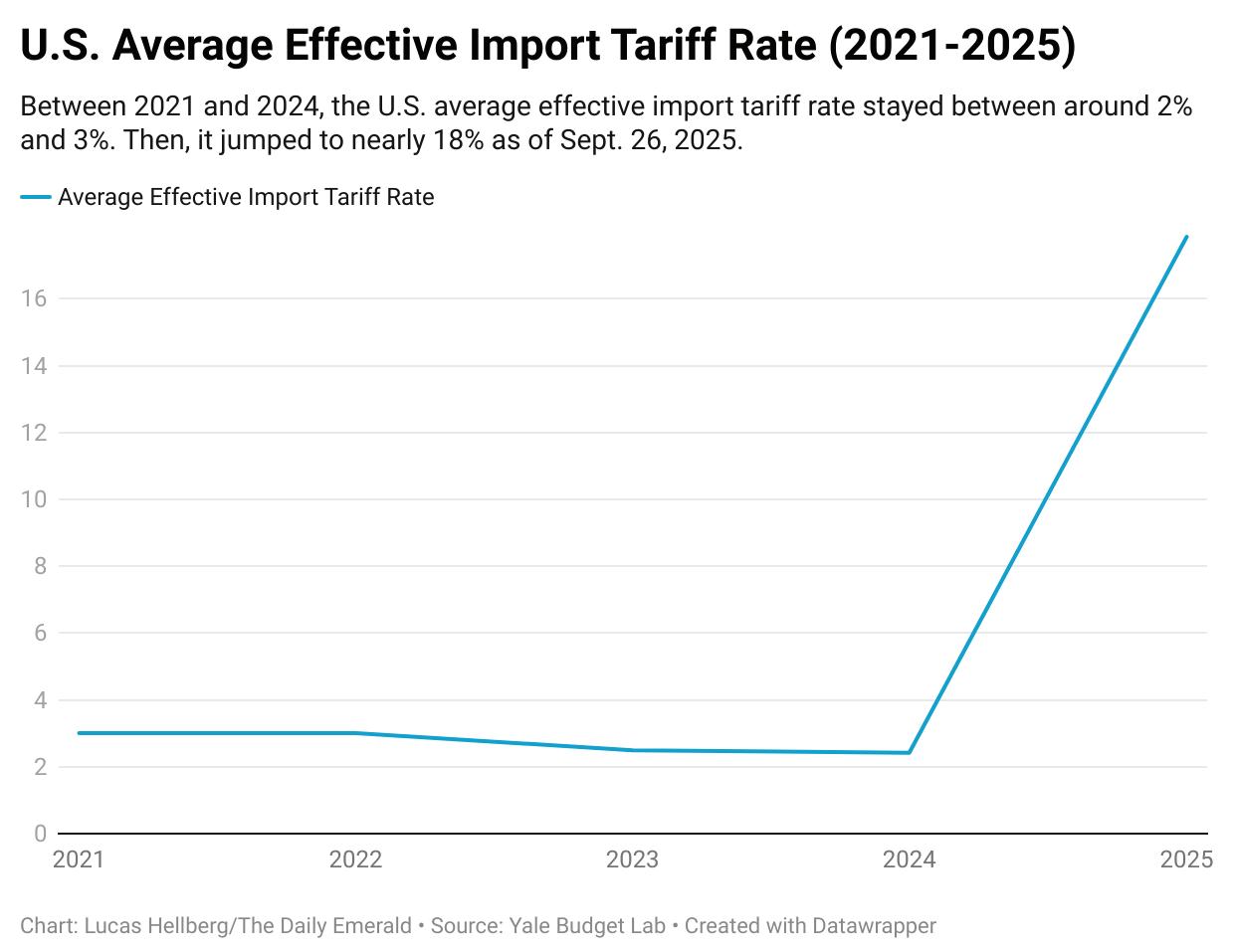
With little preparation time and plenty of dedication, local writers and actors paired together to deliver an interesting series of plays in a free performance.
By Vinny White Arts & Culture Writer
On Saturday, Oct. 4, a collection of some of Eugene’s most promising playwrights and actors gathered at Tsunami Books to perform their own original 10-minute plays. The plays were hardly rehearsed, with most groups only practicing a couple of times beforehand. The actors were still holding their scripts onstage, props were sparse and the stage itself was small. The performances that followed, while not completely polished, served as a testament to the quality of stories that can be told onstage, even with a tight timetable and no budget.
“There’s something about it that feels extra real and authentic,” actor Ben Minnis said. “It’s like, somebody wrote some words and a couple friends are gonna spend some time trying to bring those words to life together and people are gonna come share this experience with us,” he said.
The event, entitled “A Slice of Life,” was hosted by Amy Weinkauf and Marla Norton. While Weinkauf helps run an annual festival of 10-minute plays at Oregon Contemporary Theatre, she wanted to encourage people to write more and even feature works that might not always find their way into festival rotations.
Weinkauf took the idea to Norton, a local playwright
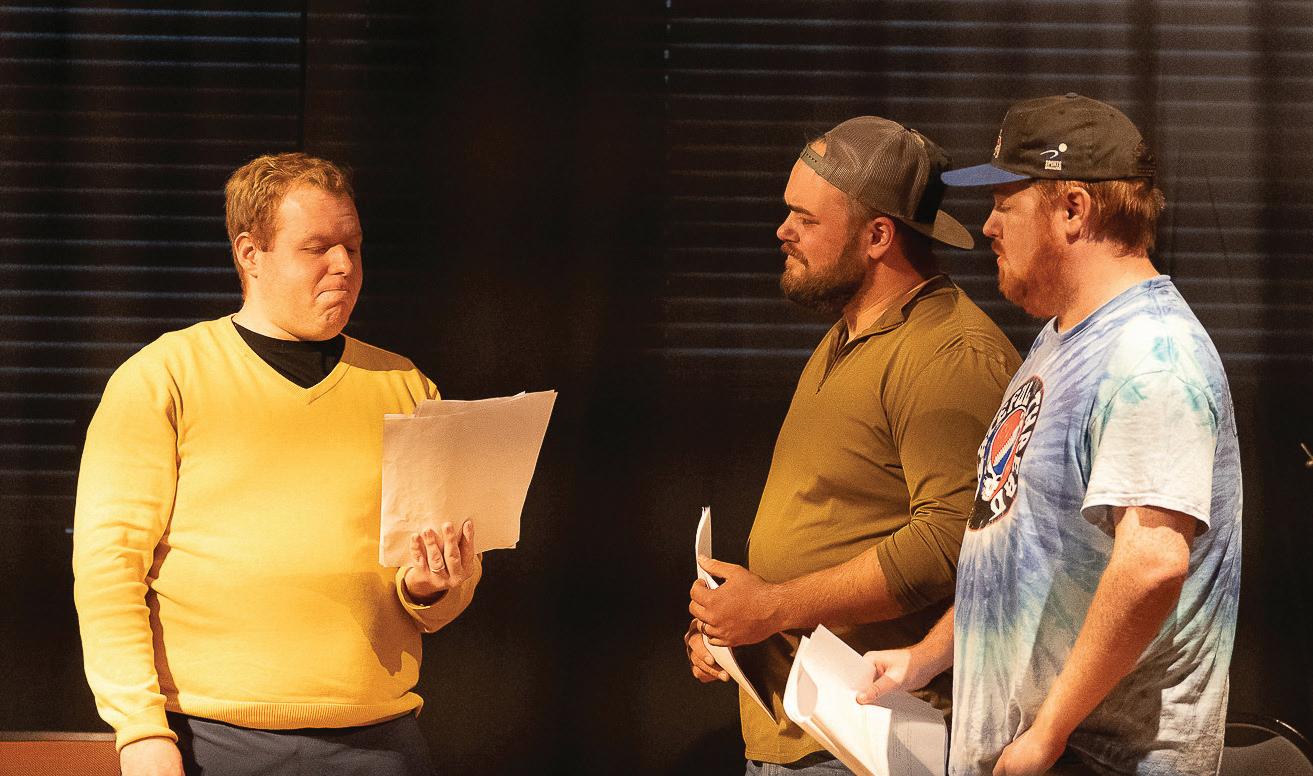
who directed a play for last year’s Northwest Ten Festival, and made it a reality.
“I said (to Norton), ‘Can’t we just get together and tell stories more than just once a year?’ We can ask questions (and) make it more opportune for the audience to participate a little bit more. That helps us be better playwrights, too.”
What followed was the beginning of what may continue to be a regularly hosted showcase of local talent. One such showcase was “Moonfarm,” a play about two dogs — one a grizzled veteran of space travel and the other a bright-eyed rookie — who are sent to space for a routine testing mission and decide to attempt a moon landing. While a unconventional idea at the surface, 10 minutes was enough time for writers Alex Ever and Aaron Michaelsmart to create a compelling, yet still comedic narrative.
Cam Houg, who played a cigarette-smoking space-canine, even came out of retirement to perform in the play. The quick turnaround of the whole process appealed to Houg.
“I think the spontaneity is a lot of fun,” Houg said. “That’s one of the things where I think having only one rehearsal honestly helped us. It’s very much in the moment which I think makes it easy to sort of play with.”
Another play that managed to cover a range of emotions was a work penned by Norton entitled “End of Life Sex.” The play, inspired by an ad posted in the Eugene Week-
ly some 30 years ago, depicted a man going to meet a terminally ill woman who posts the very same ad. The play seamlessly transitioned from funny to heartfelt to tragic and right back to funny again. Erica Towe, an actor in the play, was particularly impacted by the members of the audience present at Tsunami.
“I look around and see so many people who have influenced this area to make it possible for all of us to work,” Towe said. “I get goosebumps still because this is the heart of what we do. We collaborate and learn from each other and have discussions. It’s so important and I’m super grateful for this opportunity to do this work. It feels like such an honor,” she said.
After the plays concluded, Weinkauf stepped onstage to ask the audience two questions about each play: “What struck you?” and “What do you still have questions about?” The playwrights never answered any of these questions, instead opting to take note of what may have confused the audience and use it for future development of their work.
( ABOVE) Three actors perform a local Eugene playwright’s story. Eugene’s bookstore, Tsunami books, hosted “A Slice of Life,” an opportunity for playwrights to have actors perform five 10-minute skits before a live audience on Oct. 4, 2025.
(Katie Poluyansky/Emerald)
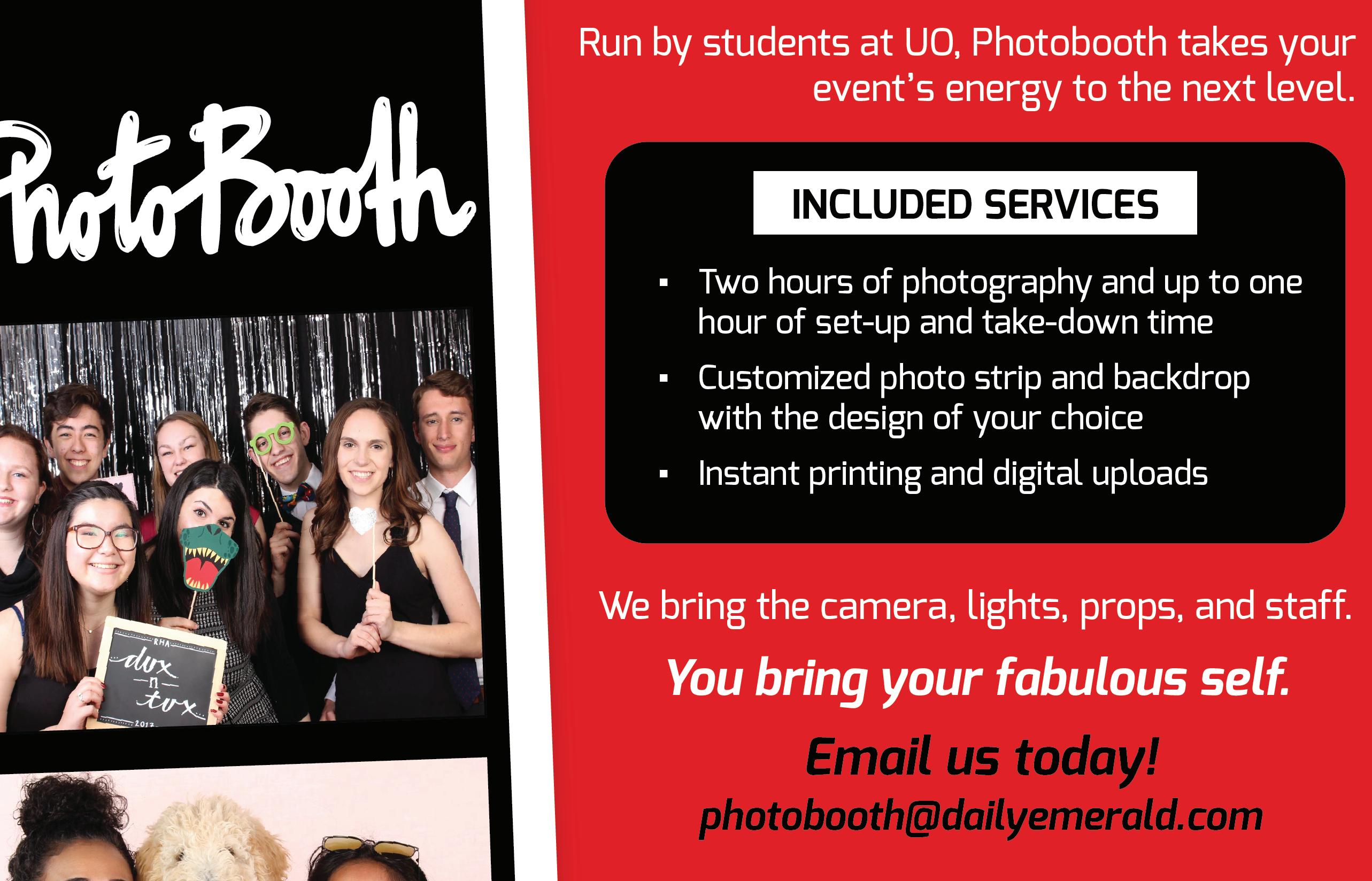




ACROSS
1 Baby syllable
4 ____ Club, where the first rule is not to talk about it
9 Student dorm overseers
10 When the moon hits your eye like a big pizza pie, in a song
11 “Whatever it __, _ don’t care”
12 Latin dance popularized in New York
13 With 19-Across, anthem played by the OMB that features the circled words in the bridge
15 Shave ice relative: ___cone
16 It’s not good
19 See 13-Across 22 Avoids by crouching 25 Southeast Asian language
26 Finish by 27 UO rival
28 St. Louis school (despite its name) with a bear mascot
29 Emerge victorious
DOWN
1 Descriptor for a certain reaper
2 “Wonderwall” band
3 A Duck’s victory gesture
4 Abstain from eating
5 “Possibly me?”
6 Shout after scoring in fútbol
7 There are 8760 of them in a yr.
8 Gossip, in slang
14 Old tobacco pipe device
17 Shining
18 “______ say, not as I do”
20 Letters after Q
21 Person, place, or thing
22 Morning droplets
23 A, in Spanish
24 Successors to cassette tapes



Photos by Fred Hall
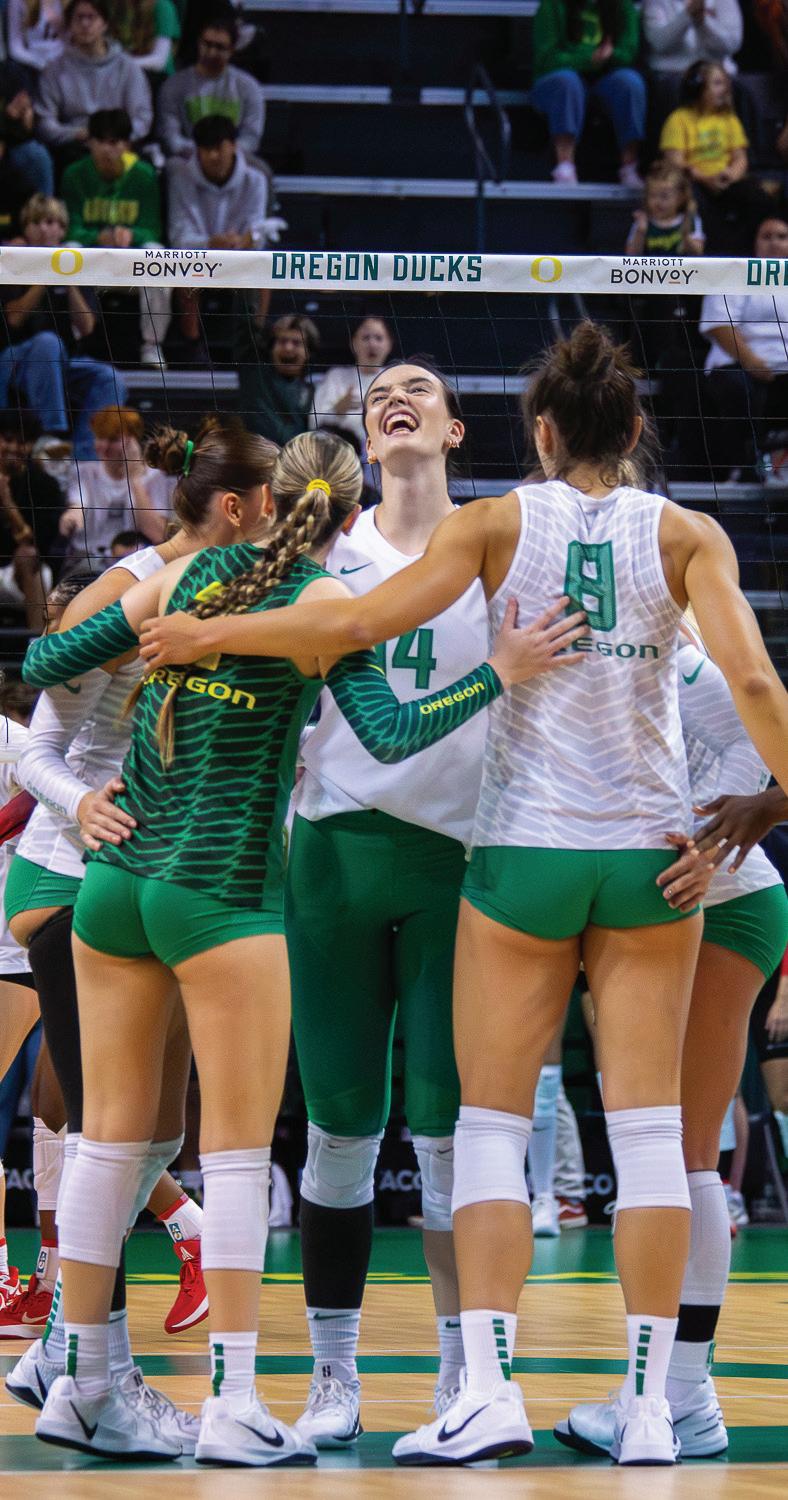

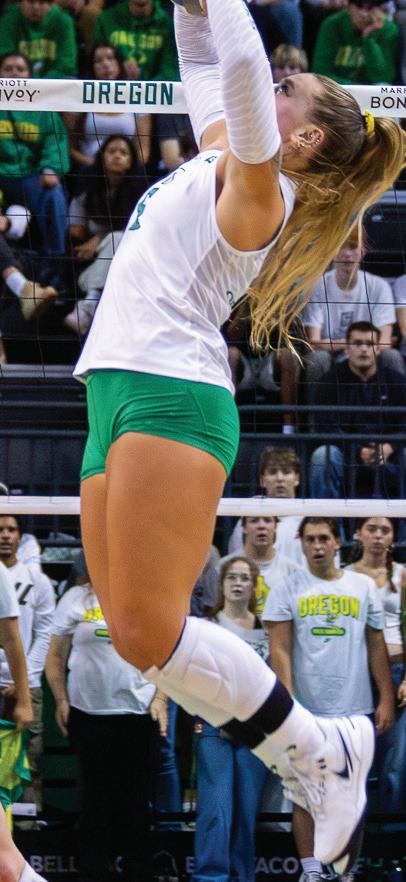
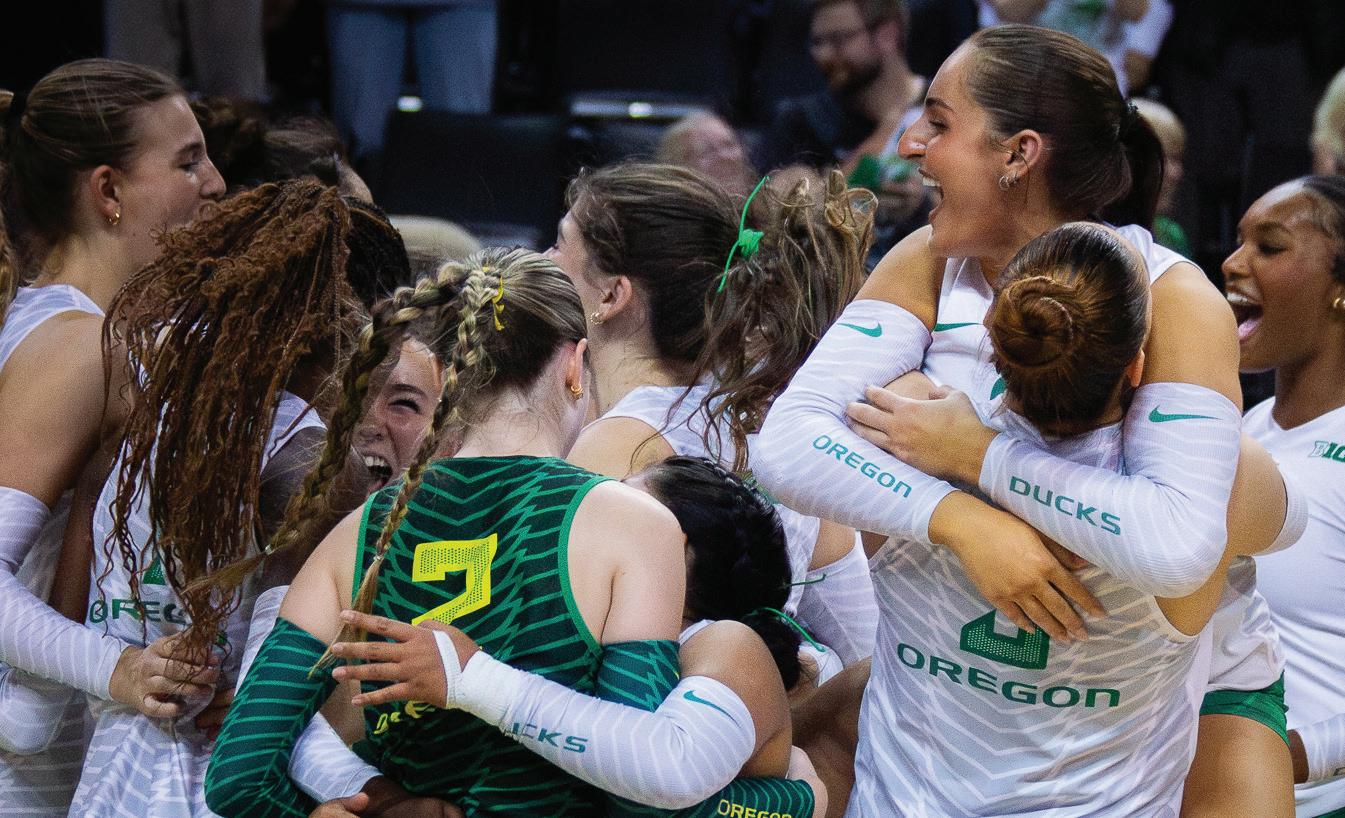


Vaulet’s 27 kills over two matches helped spearhead an undefeated homestand.
By Joe Krasnowski Sports Reporter
A volleyball team is only as good as its nucleus, and the Ducks clearly have a big part of their foreseeable future locked in with outside hitter Valentina Vaulet.
Vaulet tallied 19 total kills in the Ducks’ win over Iowa, including two during the three-point Oregon run that ended the match. She then followed up her stellar performance with an 8 point showing in the Ducks’ 3-0 win over Ohio State.
“We talked as a team about (it), (and) we want those moments,” Oregon head coach Trent Kersten said after the Iowa game. “We want to be in some of those moments, and you’ve earned the right to go for it in some of those moments. We’re going to have ups and downs through the season, but we’re going to come back to the gym and keep believing, and believing that we can be ready for the next opportunity that we get.”
Vaulet, coupled with setter and offensive engine Cora Taylor (44 assists against Iowa), helped drive an Oregon offense that needed every point it could get.
However, the most important stat for both of those contests came in the win column, as the Ducks (11-3) improved their conference record to 2-2 after starting with two away losses.
Another benefactor for the Ducks was a lively, student-filled Matthew Knight Arena that eagerly waited for each Oregon kill or Hawkeye blunder.
“Gosh, that was so awesome,” Kersten said. “We needed every single one of them that were here — and thank you for staying for the fifth set. It was just such a great volleyball environment.”
Vaulet echoed a similar sentiment.
“Our first game with all the students back, it was pretty noticeable how much they cheered for us, how much they yelled (and) how much they liked the game,” Vaulet said. “Whether we were up or down, it felt like they were really engaged with the game, so that was cool.”
“The thing we talk about as a team is that we want those (high pressure) moments,” Kersten said. “You’ve earned the right to go for it in those moments, and if you miss, we’re still going to feed you, we’re still gonna take care of you, we’re still gonna love on you, we’re just gonna figure out how to be more ready the next time we get to those moments.”
It hasn’t been all perfect in Kersten’s (and basically every other player’s) first year in Eugene, and much tougher foes await shortly. For a weekend, however, the Ducks could enjoy a pair of victories — and perhaps the start of something more.
Oregon, which lost to its first ranked opponent of the year (No. 22 USC) in straight sets in Los Angeles on Oct. 9, is now midway through its second season in the Big Ten. The Ducks will face Minnesota and Penn State in conference play at Matthew Knight Arena on Oct. 17 and 18, respectively.
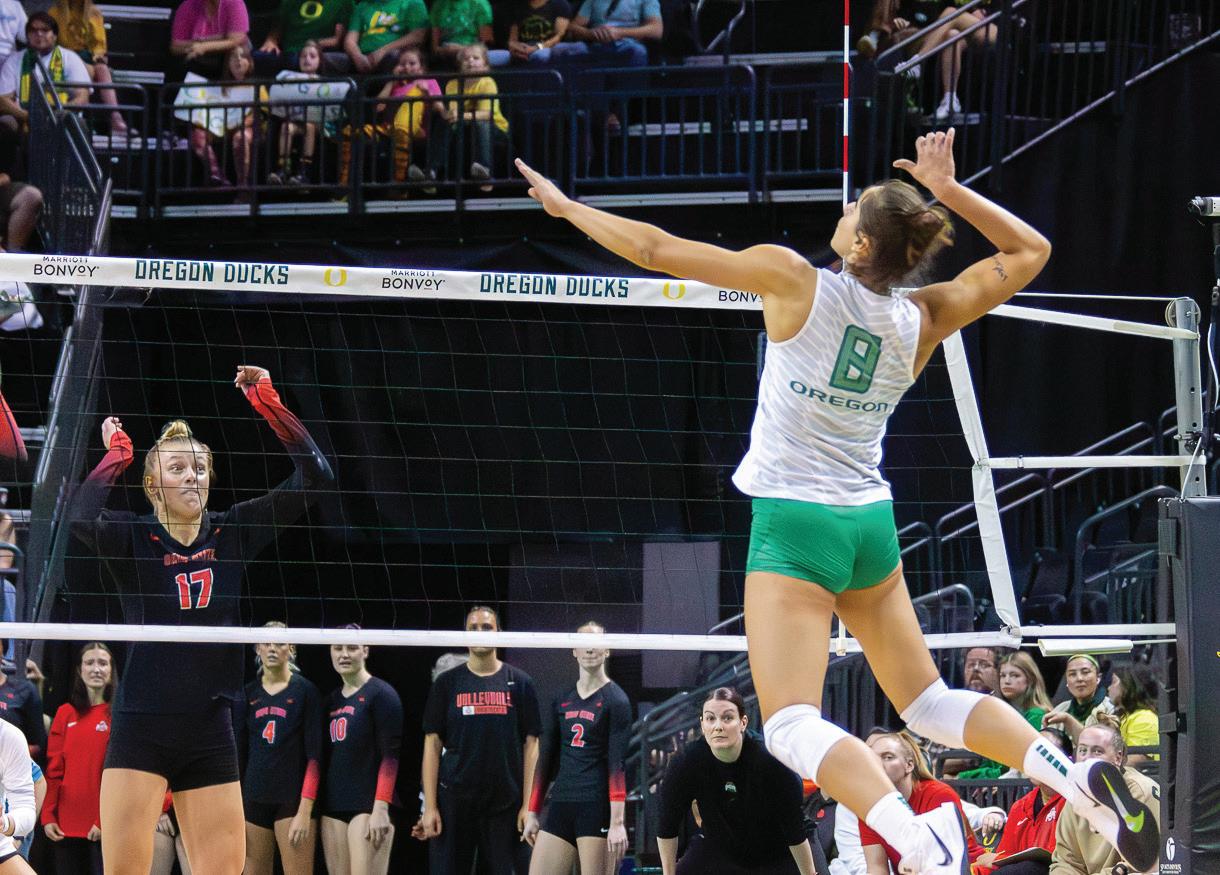
SATURDAY
Oct. 18
Oregon vs. Rutgers

Three Ducks are in the top ten at the Molly Collegiate Invitational.
Harry Leader Sports Writer
Oregon junior Darae Chung took home the win on Sept. 30 at Trysting Tree Golf Club. Three Ducks competed as individuals in the Molly Collegiate Invitational, which is a tournament that brought 48 collegiate golfers to Corvallis.
This win marks Chung’s first win at the collegiate level and the first win by an Oregon golfer this season. She finished three under par and stood above the rest as one of two golfers to finish the tournament under par.
Chung opened the tournament with a first-round score of three under par and continued to perform into the second round with a score of two under par. Chung opened both rounds with three birdies before struggling on the back end. She finished her final round two over to beat University of California Berkeley’s Michelle Woo by two strokes.
Other Ducks at the tournament were freshman Shyla Singh and redshirt senior Yvonne Vinceri, who finished in fourth and tenth place respectively. Signh finished two over par and Vinceri finished five over par.
Singh was in good standing and close behind Chung following the second round after going one under par in both. She entered the third round in third place, but struggled and finished with a score of four over. Singh’s final round pushed her down to fourth place with Erin Lee of California State University, Long Beach, overtaking her.
The performance by the Ducks is an improvement from their opening matchup against University of Texas, in which they lost 3-2. In that matchup, Singh lost a close round with Lauren Kim, who won with a two hole lead.
Chung and Singh’s performances could give the Ducks much needed momentum heading into their next tournament against Stanford on Oct. 17. Stanford recently had two golfers participate in the Windy City Collegiate, where Kelly Xu finished tied for sixth and Nora Sundberg finished tied for 25th.
A win for Oregon at Stanford would put them on the right track heading into their final tournament before the winter break on Oct. 27 in Atlanta. The Ducks will have their hands full with a Stanford team that was runner up in the national championship.

